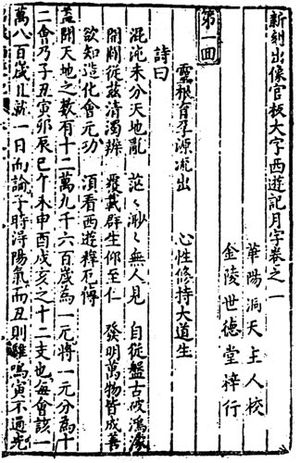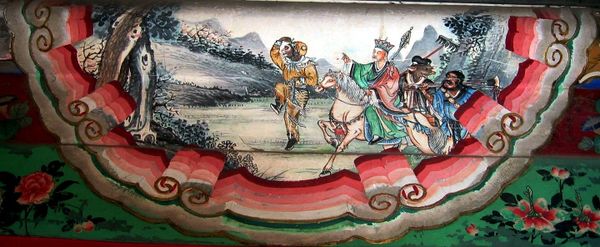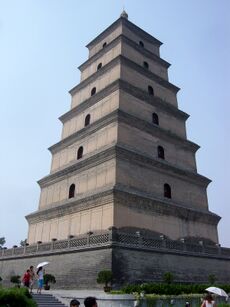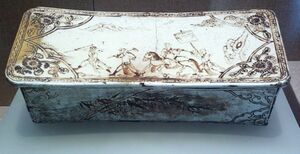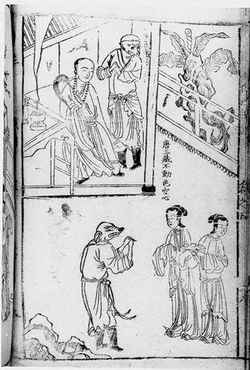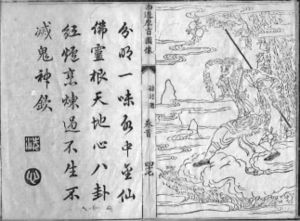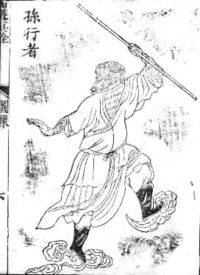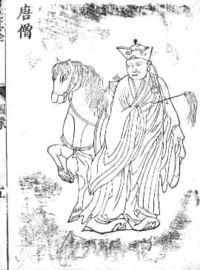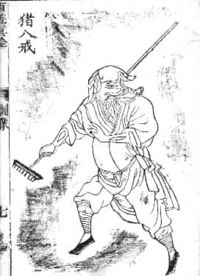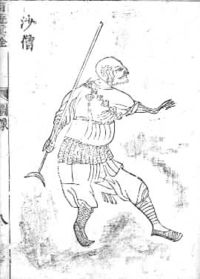الرحلة إلى الغرب
| ||||||||||||||||||||||||||||||||||||||
| ||||||||||||||||||||||||||||||||||||||
الرحلة إلى الغرب (simplified Chinese: 西游记; traditional Chinese: 西遊記; pinyin: Xī Yóu Jì; Wade–Giles: Hsi-yu chi؛ إنگليزية: Journey to the West) هي واحدة من الروايات الكلاسيكية العظيمة الأربع في الأدب الصيني. وقد نُشِرت في الأصل غفلاً من اسم المؤلف في ع1590 في عهد أسرة منگ، ويُنسب تأليفها إلى الدارس وو چنگإن منذ القرن العشرين. وفي البلدان الناطقة بالإنگليزية، فإن القصة كثيراً ما تُعرف بإسم القرد Monkey. وكان ذلك عنواناً لترجمة مختصرة ذائعة الصيت قام بها آرثر ويلي. ترجمة ويلي نُشرت أيضاً تحت العناوين مغامرات الإله القرد Adventures of the Monkey God، Monkey: [A] Folk Novel of China، و The Adventures of Monkey، وفي نسخة أكثر اختصارا للأطفال، عزيزي القرد Dear Monkey.
الرواية هي سرد خيالي للحج الأسطورية إلى الهند للراهب البوذي شوانزانگ. سافر الراهب إلى "المناطق الغربية" في عهد أسرة تانگ، للحصول على النصوص المقدسة (السوترا). البوذيساتڤا گوان يين، اتباعاً لتعاليم بوذا، أوكل بهذه المهمة إلى الراهب وإلى حماته الثلاثة المتخذين هيئة تلاميذه - وهم سون ووكونگ، ژو باجيه وشان ووجينگ - معاً برفقة الأمير التننين الذي يعتبر بمثابة حصان لشوانزانگ، الحصان الأبيض. وافقت تلك الشخصيات الأربعة على مساعدة شوانزانگ كتكفير عن خطايا الماضي.
الرحلة إلى الغرب تتمتع بخلفية قوية في الديانة التقليدية الصينية، الأساطير ونظم القيم الصينية؛ پانثيون المخلدين الطاويين والبوذيساتڤا البوذية لا تزال تعكس بعض الاعتقادات الدينية الصينية المعاصرة. ولشعبيتها المتواصلة، تعتبر الرواية قصة مغامرات، وفي الوقت نفسه ربيع للرؤية الروحانية، وأمثولة ممتدة يسافر فيها مجموعة من الحجاج إلى الهند ممثلين الأفراد المسافرين إلى التنوير.
التأليف
The earliest known full-length version of Journey to the West was published anonymously in 1592, preceded by two briefer versions.[2] The question of authorship is further complicated by the fact that a good deal of the novel's material had been published in the form of folk tales.[3][4] Anthony C. Yu, writing in 2012, warned that "this vexing dispute over the novel's authorship, similar to that on the priority of its textual versions, see-sawed back and forth for nearly a century without resolution."[5]
Hu Shih, literary scholar and former Ambassador to the United States, wrote in 1942 that the novel was thought to have been written and published anonymously by Wu Cheng'en. He reasoned that the people of Wu's hometown attributed it early on to him, and kept records to that effect as early as 1625; thus, claimed Ambassador Hu, Journey to the West was one of the earliest Chinese novels for which the authorship is officially documented.[6]
More recent scholarship casts doubts on this attribution. Brown University Chinese literature scholar David Lattimore stated in 1983: "The Ambassador's confidence was quite unjustified. What the gazetteer says is that Wu wrote something called The Journey to the West. It mentions nothing about a novel. The work in question could have been any version of our story, or something else entirely."[7] Translator W. J. F. Jenner pointed out in 1942 that although Wu had knowledge of Chinese bureaucracy and politics, the novel itself does not include any political details that "a fairly well-read commoner could not have known."[3]
The overall plot of Journey to the West was "already a part of Chinese folk and literary tradition in the form of" folk stories with informal language", a poetic novelette, and a six-part drama" play series, which was transcribed and written down, before the current version was written.[4]
Regardless of the origins and authorship, Journey to the West has become the authoritative version of these folk stories,[3] and Wu's name has become a household name accompanying the book.[8]
السياق التاريخي
The novel Journey to the West was based on historical events. Xuanzang (602–664) was a monk at Jingtu Temple in late-Sui dynasty and early-Tang dynasty Chang'an. Motivated by seeking better translations of Buddhist scripture at the time, Xuanzang left Chang'an in 629, in defiance of Emperor Taizong of Tang's ban on travel. Helped by sympathetic Buddhists, he traveled via Gansu and Qinghai to Kumul (Hami), thence following the Tian Shan mountains to Turpan. He then crossed regions that are today Kyrgyzstan, Uzbekistan and Afghanistan, into Gandhara, in what is today northern Pakistan, in 630. Xuanzang traveled throughout India for the next thirteen years, visiting important Buddhist pilgrimage sites, studying at the ancient university at Nalanda, and debating the rivals of Buddhism.
Xuanzang left India in 643 and arrived back in Chang'an in 646. Although he had defied the imperial travel ban when he left, Xuanzang received a warm welcome from Emperor Taizong upon his return. The emperor provided money and support for Xuanzang's projects. He joined Da Ci'en Monastery (Monastery of Great Maternal Grace), where he led the building of the Big Wild Goose Pagoda to store the scriptures and icons he had brought back from India. He recorded his journey in the book Great Tang Records on the Western Regions. With the support of the emperor, he established an institute at Yuhua Gong (Palace of the Luster of Jade) monastery dedicated to translating the scriptures he had brought back. His translation and commentary work established him as the founder of the Dharma character school of Buddhism. Xuanzang died on 7 March 664. The Xingjiao Monastery was established in 669 to house his ashes.
Popular and story-teller versions of Xuanzang's journey dating as far back as the Southern Song dynasty include a monkey character as a protagonist.
The supernatural abilities displayed by Wukong and some other characters were widely thought of as "magic powers" at the time of Journey to the West's writing[4] and often translated as such in non-Chinese versions of the book.
مختصر
تتألف «رحلة إلى الغرب» من مئة فصل، المحور الواقعي الوحيد فيها هو رحلة الراهب البوذي شوانزانگ Xuanzang إلى الهند لإحضار الكتب المقدسة، وقد أضيفت إليه محاور خيالية كثيرة ابتكرها خيال العامة من الناس حول ملك القردة سون وو كانگ Sun Wu Kang الذي يرافق الراهب ويحميه من خطر الشياطين والغيلان. ومع أن حبكة العمل خيالية رمزية لكنها تبرز قدرة الشعب الصيني على الصبر والعمل وتذليل العقبات في سبيل الحصول على المعرفة، وهي تصور روح الإقدام لدى هذا الشعب ورغبته في السيطرة على قوى الطبيعة ودحر قوى الشر فيها. وقد رسم الكاتب من خلال بطل الرواية ملك القردة سون وو كانغ صورة خيالية للبطل الشعبي الذي يتمتع بقوى خارقة يسخرها لنصرة المظلوم ودحر الظالم. كما حمَّل الكاتب روايته مواقفه الفكرية والسياسية مما يدور في عصره، فهو يرفض الاضطهاد ويفضح الفساد ويمجد البطولة وينحاز إلى أبناء الطبقات الدنيا. تمتاز الرواية بأسلوبها الرومنسي وبغنى أحداثها المشوقة وتنوعها وكثرة شخصياتها ودقة تصويرها، وكذلك بوضوح لغتها وقوة تأثيرها. وهي رواية خيالية في نوع حكايات الحيوانات الرامزة التي يحبذ الشعب الصيني سماعها وقراءتها على مر العصور، وتُعد إلى جانب «الممالك الثلاث» و«الضفة» و«القصور الحمراء» من أهم الروايات في تاريخ الأدب الصيني.
الشخصيات الرئيسية
الملك القرد أو سون ووكونگ
 مقالة مفصلة: سون ووكونگ
مقالة مفصلة: سون ووكونگ
Sun Wukong (孫悟空) (pinyin: sūnwùkōng) is the name given to this character by his teacher, Subhuti, the latter part of which means "Awakened to Emptiness" (in the Waley translation, Aware-of-Vacuity); he is often called the "Monkey King". He is born on Flower Fruit Mountain from a stone egg that forms from an ancient rock created by the coupling of Heaven and Earth. He first distinguishes himself by bravely entering the Water Curtain Cave on the mountain; for this feat, his monkey tribe gives him the title of "Handsome Monkey King (美猴王)." After seeing a fellow monkey die because of old age, he decides to travel around the world to seek the Tao, and find a way to be able to live forever. He eventually found the "Grand Master of Bodhi (菩提祖師)," who taught him the 72 heavenly methods of transformation and a "somersault cloud" which allows him to travel 108,000 li almost instantaneously. After angering several gods and coming to the attention of the Jade Emperor, he is given a minor position in heaven as the Keeper of Horses (弼馬溫) so they can keep an eye on him. When Sun realizes that he was given the lowest position in heaven and is not considered a full-fledged god, he becomes very angry. Upon returning to his mountain, he puts up a flag and declares himself the "Great Sage Equal to Heaven (齊天大聖)." The Jade Emperor dispatches celestial soldiers to arrest Sun Wukong, but none succeed. The Jade Emperor has no choice but to appoint him to be the guardian of the heavenly peach garden. The different varieties of peach trees in the garden bear fruit every 3,000, 6,000, and 9,000 years, and eating their flesh will bestow immortality and other gifts, so Sun Wukong eats nearly all of the ripe peaches. Later, after fairies who come to collect peaches for Xi Wangmu's heavenly peach banquet inform Sun Wukong he is not invited and make fun of him, he once again begins to cause trouble in Heaven, stealing heavenly wine from the peach banquet and eating Laozi's pills of immortality. He defeats an army of 100,000 celestial troops, led by the Four Heavenly Kings, Erlang Shen, and Nezha. Eventually, the Jade Emperor appeals to the Buddha, who seals Wukong under a mountain called Five Elements Mountain after the latter loses a bet regarding whether he can leap out of the Buddha's hand in a single somersault. Sun Wukong is kept under the mountain for 500 years and cannot escape because of a seal that was placed on the mountain. He is later set free when Tang Sanzang comes upon him during his pilgrimage and accepts him as a disciple.
His primary weapon is his staff, the "Ruyi Jingu Bang," which he can shrink down to the size of a needle and keep in his ear, as well as expand it to gigantic proportions. The rod, which weighs 17,550 pounds, was originally a pillar supporting the undersea palace of the Dragon King of the East Sea, but he was able to pull it out of its support and can swing it with ease. The Dragon King had told Sun Wukong he could have the staff if he could lift it, but was angry when the monkey was actually able to pull it out and accused him of being a thief. Sun Wukong was insulted, so he demanded a suit of armor and refused to leave until he received one. The Dragon King of the East and the other dragon kings, fearful of Sun wreaking havoc in their domain, gave him a suit of golden armor. These gifts, combined with his devouring of the peaches of immortality, erasing his name from the Book of the Dead, drinking heavenly wine from the Peach Festival, eating Laozi's pills of immortality, and being tempered in Laozi's Eight-Trigram Furnace (after which he gained a steel-hard body and fiery golden eyes that could see far into the distance and through any disguise), makes Sun Wukong the strongest member of the pilgrimage by far. Besides these abilities, he can also pluck hairs from his body and blow on them to convert them into whatever he wishes (usually clones of himself to gain a numerical advantage in battle). Furthermore, he is a master of the 72 methods of transformation (七十二变),[أ] and can transform into anything that exists (animate and inanimate).[أ] Notably, however, Sun cannot fight as well underwater, and often the pilgrimage must rely on Pigsy and Sandy for marine combat. The monkey, nimble and quick-witted, uses these skills to defeat all but the most powerful of demons on the journey.
Sun's behavior is checked by a band placed around his head by Guanyin, which cannot be removed by Sun Wukong himself until the journey's end. Tang Sanzang can tighten this band by chanting the "Ring Tightening Mantra" (taught to him by Guanyin) whenever he needs to chastise him. The spell is referred to by Tang Sanzang's disciples as the "Headache Sutra". Tang Sanzang speaks this mantra quickly in repetition when Sun disobeys him.
Sun Wukong's childlike playfulness and often goofy impulsiveness is in contrast to his cunning mind. This, coupled with his great power, makes him a trickster hero. His antics present a lighter side in the long and dangerous trip into the unknown.
After completion of the journey, Sun is granted the title of Victorious Fighting Buddha (斗战胜佛; 鬥戰勝佛; dòu zhànshèng fú) and ascends to Buddhahood.
تريپيتاكا أو تانگ سانزانگ
The monk Tang Sanzang (唐三藏, meaning "Tripitaka Master of Tang," with Tang referring to the Tang dynasty and Sanzang referring to the Tripiṭaka, the main categories of texts in the Buddhist canon which is also used as an honorific for some Buddhist monks) is a Buddhist monk who had renounced his family to become a monk from childhood. He is just called "Tripitaka" in many English versions of the story. He set off for Tianzhu Kingdom (天竺国, an appellation for India in ancient China) to retrieve original Buddhist scriptures for China. Although he is helpless in defending himself, the bodhisattva, Avalokiteśvara (Guanyin), helps by finding him powerful disciples who aid and protect him on his journey. In return, the disciples will receive enlightenment and forgiveness for their sins once the journey is done. Along the way, they help the local inhabitants by defeating various monsters and demons who try to obtain immortality by consuming Tang Sanzang's flesh.
ژو باجييه
Zhu Bajie (豬八戒, literally "Pig of the Eight Prohibitions") is also known as Zhu Wuneng ("Pig Awakened to Power"), and given the name "Monk Pig", "Piggy", "Pigsy", or just simply "Pig" in English.
Once an immortal who was the Marshal of the Heavenly Canopy commanding 100,000 naval soldiers of the Milky Way, he drank too much during a celebration of the gods and attempted to harass the moon goddess Chang'e, resulting in his banishment to the mortal world. He was supposed to be reborn as a human but ended up in the womb of a sow due to an error on the Reincarnation Wheel, which turned him into a half-man, half-pig humanoid-pig monster. Zhu Bajie was very greedy, and could not survive without eating ravenously. Staying within the Yunzhan Dong ("cloud-pathway cave"), he was commissioned by Guanyin to accompany Tang Sanzang to India and given the new name Zhu Wuneng.
However, Zhu Bajie's lust for women led him to the Gao Family Village, where he posed as a handsome young man and helped defeat a group of robbers who tried to abduct a maiden. Eventually, the family agreed to let Zhu Bajie marry the maiden. But during the day of the wedding, he drank too much alcohol and accidentally returned to his original form. Being extremely shocked, the villagers ran away, but Zhu Bajie wanted to keep his bride, so he told the bride's father that if after one month the family still did not agree to let him keep the bride, he would take her by force. He also locked the bride up in a separate building. At this point, Tang Sanzang and Sun Wukong arrived at the Gao Family Village and helped defeat him. Renamed Zhu Bajie by Tang Sanzang, he consequently joined the pilgrimage to the West.
His weapon of choice is the jiuchidingpa ("nine-tooth iron rake"). He is also capable of 36 transformations and can travel on clouds, but not as fast as Sun Wukong. However, Zhu is noted for his fighting skills in the water, which he used to combat Sha Wujing, who later joined them on the journey. He is the second strongest member of the team.[بحاجة لمصدر]
Pigsy's lust for women, extreme laziness, and greediness, made his spirituality the lowest in the group, with even the White Dragon Horse achieving more than him, and he remained on Earth and was granted the title "Cleaner of the Altars," with the duty of cleaning every altar at every Buddhist temple for eternity by eating excess offerings.
شا ووجينگ
Sha Wujing (沙悟淨, "Sand Awakened to Purity"), given the name "Friar Sand", "Sand Monk", "Sandman", "Sand Fairy", "Sand Orc", "Sand Ogre", "Sand Troll", "Sand Oni", "Sand Demon", "Sand Monster", "Sand Hulk", "Sand", or "Sandy" in English, was once a celestial Curtain Lifting General, who stood in attendance by the imperial chariot in the Hall of Miraculous Mist. He was exiled to the mortal world and made to look like a sandman, orc, ogre, troll, oni, demon, monster, or hulk because he accidentally smashed a crystal goblet belonging to the Queen Mother of the West during a Peach Banquet. The now-hideous immortal took up residence in the Flowing Sands River, terrorizing surrounding villages and travelers trying to cross the river. However, he was subdued by Sun Wukong and Zhu Bajie when Tang Sanzang's party came across him. They consequently took him in, as part of the pilgrimage to the West.
Sha Wujing's weapon is a magic wooden staff wrapped in pearly threads, although artwork and adaptations depict him with a Monk's spade staff. He also knows 18 transformation methods and is highly effective in water combat. He is known to be the most obedient, logical, and polite of the three disciples, and always takes care of his master, seldom engaging in the bickering of his fellow disciples. He has no major faults nor any extraordinary characteristics. Due to this, he is sometimes seen as a minor character. He does however serve as the peacekeeper of the group, mediating between Wukong, Bajie, and even Tang Sanzang and others. He is also the person whom Tang Sanzang consults when faced with difficult decisions.
He eventually becomes an arhat at the end of the journey, giving him a higher level of exaltation than Zhu Bajie, who is relegated to cleaning altars, but lower spiritually than Sun Wukong and Tang Sanzang, who are granted Buddhahood.
استطرادات
The brief satirical novel Xiyoubu (西遊補, "A Supplement to the Journey to the West," ح. 1640) follows Sun Wukong as he is trapped in a magical dream world created by the Qing Fish Demon, the embodiment of desire (情, qing). Sun travels back and forth through time, during which he serves as the adjunct King of Hell and judges the soul of the recently dead traitor Qin Hui during the Song dynasty, takes on the appearance of a beautiful concubine and causes the downfall of the Qin dynasty, and even faces Pāramitā, one of his five sons born to the rakshasa Princess Iron Fan,[ب] on the battlefield during the Tang dynasty.[9] The events of Xiyoubu take place between the end of chapter 61 and the beginning of chapter 62 of Journey to the West.[10] The author, Dong Yue (董說), wrote the book because he wanted to create an opponent—in this case desire—that Sun could not defeat with his great strength and martial skill.[11]
اقتباس الإعلام
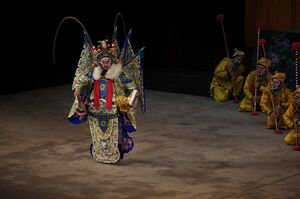
Saiyūki (西遊記) also known by its English title Monkey and commonly referred to by its title song, "Monkey Magic," is a Japanese television series starring Masaaki Sakai, produced by Nippon TV and International Television Films in association with NHK (Japan Broadcasting Corporation) and broadcast from 1978 to 1980 on Nippon TV. It was translated into English by the BBC.
In the 1980s, China Central Television (CCTV) produced and aired a TV adaptation of Journey to the West under the same name as the original work. A second season was produced in the late 1990s covering portions of the original work that the first season skipped over.
In 1988, Japanese anime Doraemon released a movie named Doraemon: The Record of Nobita's Parallel Visit to the West which is based on the same story.
In 1997, Brooklyn-based jazz composer Fred Ho premiered his jazz opera Journey To The East, at the Brooklyn Academy of Music, which he developed into what he described as a "serial fantasy action-adventure music/theater epic," Journey Beyond the West: The New Adventures of Monkey based upon Wu Cheng’en's 16th-century novel. Ho's pop-culture infused take on the story of the Monkey King has been performed to great acclaim.
It also made its way to the Mass Electronic Entertainment Media (Reimagined Video game adaptation) in 2009, titled Enslaved: Odyssey to the West, which was released in October 2010 for Microsoft Windows, PlayStation 3, and Xbox 360. It was developed by Ninja Theory and published by Bandai Namco Entertainment. The main protagonist 'Monkey' is voice acted by Andy Serkis.
On 20 April 2017, Australia's ABC, TVNZ, and Netflix announced production was underway in New Zealand on a new live-action television series, The New Legends of Monkey, to premiere globally in 2018. The series, which is based on Journey to the West, is made up of 10 half-hour episodes. While there has been enthusiasm for the new series, it has also attracted some criticism for "whitewashing,"[12] since none of the core cast are of Chinese descent, with two of the leads having Tongan ancestry[13] while only one, Chai Hansen, is of half-Asian (his father is Thai) descent.[14]
More recently in 2017, Viki and Netflix hosted a South Korean show called A Korean Odyssey; a modern comedy retelling that begins with the release of Sun Wukong/Son O-Gong and the reincarnation of Tang Sanzang/Samjang.
In August 2020, Game Science Studios announced a video game adaptation called Black Myth: Wukong.[15]
On May 16, 2020, The Lego Group released the theme, Lego Monkie Kid, to which Journey of the West was credited as the main inspiration, featuring many characters from the original work. 4 days later on May 20, an animated television series pilot was released to coincide with the theme, and was later picked up for production and released serially starting in September 2020.
انظر أيضاً
- قائمة الاقتباسات الإعلامية من الرحلة إلى الغرب
- Dragon Ball
- Dream of the Red Chamber
- One Piece
- Enslaved: Odyssey to the West
- The God of High School
- Romance of the Three Kingdoms
- Saiyuki
- Starzinger
- Water Margin
ملاحظات
الهامش
- ^ Yu (2012), p. 18.
- ^ Yu (2012), pp. 17–18.
- ^ أ ب ت Jenner 1984
- ^ أ ب ت "Journey to the West" (in الإنجليزية). Encyclopedia Britannica. 2023-05-10. Retrieved 2023-05-22.
- ^ Yu (2012), p. 10.
- ^ Hu Shih (1942). "Introduction". In Arthur Waley (ed.). Monkey. Translated by Arthur Waley. New York: Grove Press. pp. 1–5.
- ^ Lattimore, David (6 March 1983). "The Complete 'Monkey'". The New York Times.
- ^ Shi (1999).
- ^ Dong, Yue; Wu, Chengẻn (2000). The Tower of Myriad Mirrors: A Supplement to Journey to the West. Michigan classics in Chinese studies. Translated by Lin, Shuen-fu; Schulz, Larry James. Ann Arbor: Center for Chinese Studies, The University of Michigan. ISBN 9780892641420.
- ^ Dong & Wu (2000), p. 5.
- ^ Dong & Wu (2000), p. 133.
- ^ Whitehead, Mat (20 April 2017). "'Monkey Magic' Returns As Filming Begins On 'The Legend of Monkey' In New Zealand". Huffington Post (in الإنجليزية الأسترالية). Retrieved 2017-04-20.
- ^ Ma, Wenlei (26 January 2018). "The New Legends of Monkey writer responds to 'whitewashing' accusations". news.com.au.
- ^ "Chai Romruen". IMDb. Retrieved 2017-04-20.
- ^ "Gorgeous Action-RPG Black Myth: Wukong Revealed with Extended Gameplay Trailer - IGN". 20 August 2020.
وصلات خارجية
النص الكامل
الصينية التقليدية
- Journey to the West from WikiSource (UTF-8 encoding)
- Journey to the West from the Gutenberg Project (UTF-8 encoding)
- Journey to the West from Open Lit (Big5 encoding)
- Journey to the West from MillionBook.net (Big5 encoding)
الصينية المبسطة
- Journey to the West from Xahlee (UTF-16 encoding)
إصدار منقح
- The Monkey King - read the original Chinese story with contextual English and Pinyin popup definitions
الإنگليزية
- Journey to the West - Freeware complete English text version in PDF format (2.56MB)
روابط أخرى
- Harv and Sfn no-target errors
- CS1 الإنجليزية الأسترالية-language sources (en-au)
- Short description is different from Wikidata
- Lang and lang-xx template errors
- Articles containing صينية-language text
- Articles that link to foreign-language Wikisources
- Articles containing simplified Chinese-language text
- Articles containing traditional Chinese-language text
- Articles containing إنگليزية-language text
- Pages using Lang-xx templates
- Articles with hatnote templates targeting a nonexistent page
- Articles with unsourced statements from April 2022
- Pages with empty portal template
- روايات كلاسيكية صينية
- الرحلة إلى الغرب
- روايات عقد 1590
- Literature featuring anthropomorphic characters
- أدب أسرة مينگ
- روايات الحج
- Picaresque novels
- كتب عن الهند
- أعمال نشرت باسم مستعار
- روايات خيالية في عقد 1590
- 1592 novels
- 16th-century Chinese novels
- Books about China
- Books about India
- Buddhist novels
- Chinese classic novels
- Chinese comedy novels
- Chinese fantasy novels
- Chinese novels adapted into films
- Chinese novels adapted into television series
- Depictions of Gautama Buddha in literature
- Epic novels
- Literature about pilgrimages
- Ming dynasty literature
- Ming dynasty novels
- Monkeys in popular culture
- Novels adapted into operas
- Novels set in 7th-century Tang dynasty
- Novels set in Xi'an
- Pigs in literature
- Pilgrimage accounts
- Shenmo novels
- Taoism in popular culture
- Works of uncertain authorship
- Works published anonymously
